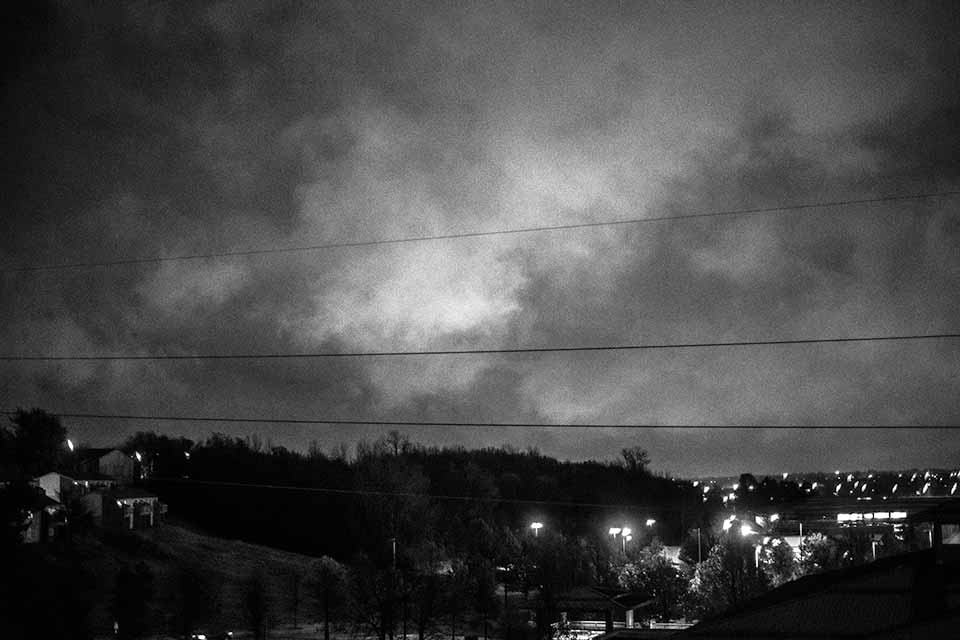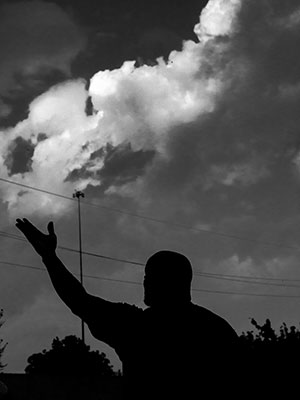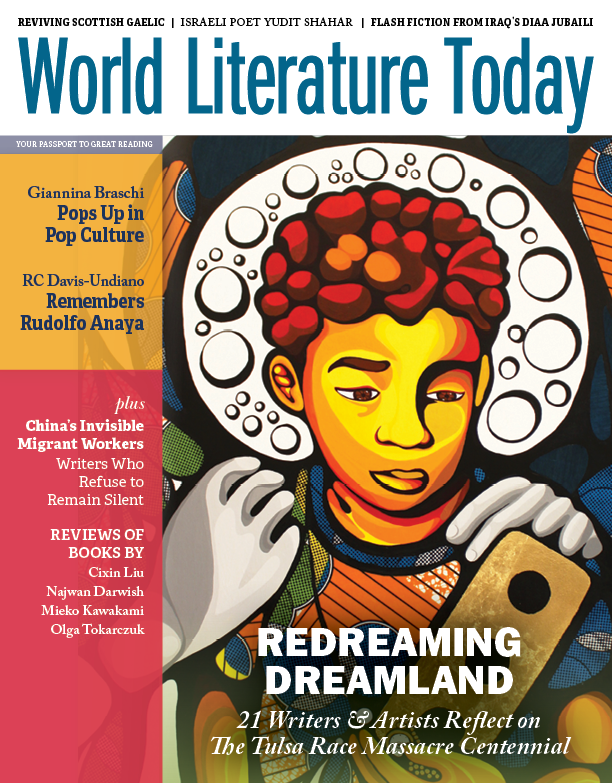The Slope

In the following story, the narrator imagines what role her family might have played in a race massacre—and the generations of silence that followed.
May 20, 2009
We used to ride our bikes over it. In the strip mall, behind the old JCPenney that’s now a Christian crafts store, there was an empty parking lot for shipping trucks, trash compactors, recycling dumpsters, and us. The lot covered roughly the length of a high school football field, and at the very far end, where a goalpost might sit, was the slope. That was the real appeal. Where the lot’s perimeter met a weather-stained six-foot concrete wall (meant to keep us out of the golfing range next door), the ground sloped sharply upward.
It slopes upward. The slope. It’s still there. This morning, after the funeral, I went by for the first time in a long time. I told Ma I couldn’t meet her for breakfast; I had some errands to run before my flight. I don’t lie to her. The slope was on the way. Parked Ma’s Chrysler in front of the store and walked the long way around back.
We were lucky. The forty-five-degree rise in the pavement created the perfect makeshift bike ramp. Back then, we didn’t own Mongooses or anything, but we had Huffys and Dynos and Kmart bikes. Good enough to catch some gray sky and tap the mildewed wall, or eat the pavement and crack a tooth on the way down.
I must have looked odd, a grown person in thin cotton khakis and a white button-down shirt staring at a slope in the ground. But there I was again. Twelve-year-old me. Fumbling a pedal grind, wiping out and burning the skin off my thigh. Twice. The hospital visit I tried to avoid became three.
If you’d stop riding like a demon, maybe we could still save your soul. Those were Ma’s words. “The demon rides,” she started calling them, possessed us. If she couldn’t make me wear a bra or brush my hair, the least she could do was save my soul.
What do you want with that old parking lot anyway? I remember her asking as we scrubbed, starched, ironed, and folded. We came from tough Scottish stock. Pop was a fourth-generation oil field worker. There was always plenty of blackened laundry to make clean again.
I never answered Ma’s question. We were twelve. We didn’t ask ourselves what the slope was for. In the middle of a strip mall. We practiced all the one-handers and no-footers our stupid bodies could handle. We took it for granted that the slope was just like any other paved hill, and we were going to ride it until someone told us not to.
There were five of us that made up the main roster of “the demon riders.” Rust, Fiddler, Husk, Gator, and me, the only girl. You could say we were a gang in the technical sense. On summer nights, when everyone was out, there might be up to ten of us white kids crashing into each other on the lot. When the smell of sulfur got bad, and the asthmatics couldn’t ride, our numbers might dwindle to two or three.
Older, wiser kids stayed clear of us, but occasionally Fiddler’s brother would tag along if he was out of juvie. I don’t recall his name, but I know he was perpetually in the eleventh grade and rode a Raleigh ten-speed with electric-blue handlebars.
It was Fiddler’s brother who told us about the bodies buried under the slope. Not Ma or Pop or anyone in our family. He said my grandfather had been one of the leaders. He’d bring a souvenir to prove it. A photo album. Inside, a seventy-year-old picture of my grandfather and a bunch of other men shoveling dirt, digging holes, smiling. Everyone who worked in the oil fields knew, he said. The boy seemed to enjoy the look of shock on my face.
I’ve tried to picture that moment again: the five of us kids standing at attention, straddling our bikes in a circle around Fiddler’s brother as if he were the sun. Or maybe no one paid attention to him but me, while the others spun orbits around us. All I remember for sure is feeling sick to my stomach.
He never came back with the album. Never saw him again at the slope either.
After the boy’s account, the possibilities of grandfather’s souvenir had begun entering my dreams. Yellowing, speckled, photo paper. Fingerprint-smudged cellophane. I finally asked Ma about it. She sat me down in Pop’s old easy chair. She had heard the rumors, too. There was no photo that she knew. If it were true, why didn’t the boy show his face again? Because no proof exists, she said.
I heard the craft store’s back door bang shut. I couldn’t stick around the lot much longer. The sulfur in the air was making me nauseous. I had a flight to cancel, some phone calls to make. The number of times we raced our tires over it. Slammed our bikes into it. Bled from gashed knees and scraped chins all over that grave.
May 23, 2009
Rush hour wasn’t quite over on the way back from the newspaper’s office, and I needed to stop listening to stories about the city council race. I called Ma to ask if she wanted me to pick up anything for dinner. Our conversations were chipper if we kept our talk to the three C’s: church, choir practice, and cast-iron cooking. Anything about the slope and our conversation soured pretty quickly.
Our conversations were chipper if we kept our talk to the three C’s: church, choir practice, and cast-iron cooking.
“We’re just getting in from choir.”
“I know, Ma. That’s why I called after it was over.”
“Well, can you give us a minute to walk inside and settle in?
In the background, I heard Pop’s disapproving grunts.
“You can put the phone on speaker while you settle.”
“Your father doesn’t like speaker.”
“I know, Ma. I’ve heard it a thousand times. The government is recording our every move. Why help them?”
“Well, if you know what he thinks, why did you . . .” She trailed off, either because Pop left the room, or because she was pulling her choir robe over her head. “. . . why did you call?”
“I forgot your recipe for three-bean casserole.”
“That’s a fib, honey. You’re not calling to ask about the parking lot, are you? Don’t tell me you went back there again today?”
“I won’t tell you.”
“It doesn’t do you any good to focus on dark things. Think of more pleasant stuff. Go to Him.”
I bit my tongue. I was wondering how this conversation had switched so quickly to the fourth C—Christ.
“Ma. Why aren’t you sadder? That’s what I want to know.”
“Because I don’t think about things that are in His hands.” She trailed off. “You know, Annie, I’m starting to think you didn’t stay in town an extra week to spend time with your folks.”
“Ma. The photo album—”
“—I wish you’d let the dead stay dead.”
When I can’t sleep, I do laundry. Old habits die hard. I wandered from room to room in my crew socks, scooping up mildewy towels I left on the floor. Being out of fresh towels could keep me up at night. I passed an hour in the basement listening to the knocking of the dryer and feeling the room’s dampness invade my skin. And writing this.
There are human remains everywhere. Not only in cemeteries. Under almost every building, sidewalk, or parking lot, there’s dirt. And in the dirt—casualties. Of countless brawls and battles and accidents. We don’t think about the number of dead under our schools or amusement parks. Somewhere, a hole had to be dug in the ground to lay them to rest, right?
I put my folded white shirts away in the dresser and hung my pressed pants in the closet. Since staying in my old bedroom, I had been having a terrible time adjusting. I tried my best to make the space warm and inviting, but it was not uncommon for me to wake up five times in one night. I slid my chilled body under the bedsheets, hoping in my sleep to find some of that pleasant stuff Ma kept talking about.
May 24, 2009
I rose having slept three hours less than normal. The phone rang with a caller ID that read: potential spam. I would normally let it go, but for some reason, I answered. On the other line was someone I was hoping would call—Laurel Brand, a journalist for the New Times. She had been working on a story on the perpetrators for years but was having a devil of a time, as she put it, finding anyone who would go on record.
We had set up a date to meet in person tomorrow before I flew back home, but the council race was eating up more of herschedule than she anticipated. Laurel had a window to talk today and didn’t know when she would be available again. I punched Laurel’s address into my GPS and asked Ma if she needed anything from the store.
The body sat from sunup to sundown in a closed golden maple casket behind his house. We were burying my grandfather, CT, on his land, under the giant red sweetgum tree we used to take refuge in during searing summers. It was unorthodox, but the Stewarts were never a family that paid attention to regulations.
My grandfather died peacefully, at home, in the bed he hand-carved from oak, surrounded by four generations of family. The Stewarts had taken turns massaging his cold hands for comfort and singing his favorite hymns. He had lost his sight by then—his once sea-green eyes had turned gray and fishy, but he kept them open to ease the minds of the six daughters, fourteen grandchildren, and thirty-odd great-grandchildren who drifted in and out of his bedroom throughout his last week, wiping his pale forehead and moistening his dry, red mouth.
At the wake, gusts of warm wind swept through the open windows, lifting cocktail napkins and tussling the fabric of dark skirts and dress pants. It was CT making his presence felt, folks said. Anyone who knew him over the past hundred-odd years—the congregation from First Methodist, lifelong friends from the American Legion, his old Lucky Strike bowling team—came to the house to pay their respects. He was showing us his usual gratitude.
By sunset, most had passed through, and CT had been lowered into the dirt. The spit-roasted pig that the Dawsons brought over had been picked clean down to the knuckles. A trash can overflowing with crushed Coors cans leaned against a barrel of cartilage and bones. Everyone was sauced. After hearing the ninth version of the time CT pulled those farmworkers out of that overturned pickup, I was ready to leave.
His bedsheets had been washed and changed. I had ducked into grandfather’s bedroom to call a cab. It felt strange to sit in his bed, in the spot where he had just passed. Through his window, I could see everything else coming to its natural end. Cars and trucks pulling out of the gravel driveway. A drunk man playing the violin; his inexperienced shrieks cutting through the dark. Pop throwing handfuls of dirt onto the fresh mound.
I was on the phone when Ma came in behind me. Face bloated, makeup soggy. She had dipped into the punch, which wasn’t like her at all. Standing there, she looked like she might hug me, which was also unusual.
Instead, she took something that was tucked under her arm and tossed it onto the bed. I picked it up. A photo album. Maybe because of the punch, she turned around and closed the doors behind her.
May 25, 2009
I was surprised. On the way to Laurel’s, I drove past an espresso bar, a green market, and a hipster cocktail bar. Laurel, a white journalist, lived out north in what used to be a black neighborhood. Drive under the freeway, past the Baptist Church and the Boys and Girls Club, and you enter the four or five square miles our parents warned us not to cross.
Going there on my own, the shame started to settle in. I hadn’t been back to this side of town since I was sixteen.
We were sophomores in high school when Rust started calling us again. Whenever he was bored with our neck of the woods, he would call up the gang. This time, instead of the slope, we’d drive north in his Saturn. If it hadn’t been for Rust’s boredom and Gator’s gas money to burn, I don’t know if we would have seen this side of town.
What I remembered most is that Rust always made me slink down in the back seat as we approached the dividing line. He never answered why. Maybe he thought a girl would attract unwanted attention? In my mind, a car full of white kids would be the thing attracting attention. I did it anyway because Rust was the only kid I knew with a car, and it didn’t pay to argue with him.
The corners of Rust’s cheap blue window tint were curling, so even though I was slumped down, I could still make out a sign here, a storefront there. Much of what I recall about those drives north are corners of corners. And the sounds falling in through Rust’s open sunroof of men and women shouting, kids playing, music.
We got out every once in a while on those “demon drives,” as I began calling them, to get gas at the Gas-n-go, or to page someone’s girlfriend. I was forever pressing Rust to stop so we could get a burger at least. Or sit on the school bleachers and watch a game or something. But he never did. Didn’t matter who was behind the wheel; we never stopped the car for long. We always ended up driving through the neighborhood and going home. We didn’t have a plan or a reason to be there. I realize now they only wanted to look. Something in me possessed me to look, too.
No one ever wanted to talk about the slope.

No one in the car ever wanted to talk about the slope. I brought up Fiddler’s brother a couple of times, but the conversation went nowhere. After a few years, I pushed the idea of the photo existing out of my mind, moved across the country for college. No proof existed.
But part of me knew, crossing under the overpass, slung low in the back seat, that the kids we passed on those drives—the legs, and necks, and hands that I caught pieces of—didn’t have relatives because of mine.
Laurel’s street was still except for the swift rain beating down steadily against the Chrysler’s rooftop. Her house was a fixer-upper with a sagging porch. But her block was lined with beautiful single-family homes, more dignified than the housing where we grew up. I felt a sickness return to my stomach. For the first time that day, I thought of the work I was missing. And Ma.
Sitting in my car, with the rain striking down, I started thinking. My grandfather in his work pants, crushed with dirt. His smile hollow and endless. His sea-green eyes, something like mine. I saw him every time I went to sleep. Sometimes I imagined the men behind him with their shovels and heard them whistling in the photo. Other times I saw my fingers smudging the prints. Since the funeral, my dreams were propelling me on this street and, with any luck, in a room with the only person I knew of who wanted to hear this story.
And there I was. Parked and staring at Laurel’s entrance. With proof on the seat next to me. I could see myself, thirty-five-year-old me, opening the car door, getting soaked dashing toward her porch. Running up her rickety steps, made worse by the rain. Steps that I could plunge through at any moment.
Sometimes I imagined the men behind him with their shovels and heard them whistling through the photo.
But let’s say I arrive on her doorstep in one piece. My knuckles rapping on the peeling wood. The sound of footsteps approaching. Before I can finish wiping my damp forehead and catching my breath, the door opens a crack.
What would I say?
What did I want with that old parking lot anyway?
I heard the sounds of men and women shouting, and kids playing outside my car. No proof existed that black men organizing around the city were targeted and murdered, their bodies scattered throughout town, including under the pavement that begins in the parking lot behind the old JCPenney and ends somewhere under a private golfing mound.
No proof, just some old photos.
The smallest statistical chance existed that talking with Laurel would change anything I already knew. The greater chance existed that in talking, I’d move the darkness from myself onto somebody else.
I turned the key in the ignition. I slinked off past the Gas-n-go and the bleachers, the espresso bar and the tapas place. I stopped at the green market and bought a pound of ground beef, an onion, three cans of kidney beans, butter beans, and baked beans. I called Ma when I was more than halfway there.
Ann Arbor, Michigan











